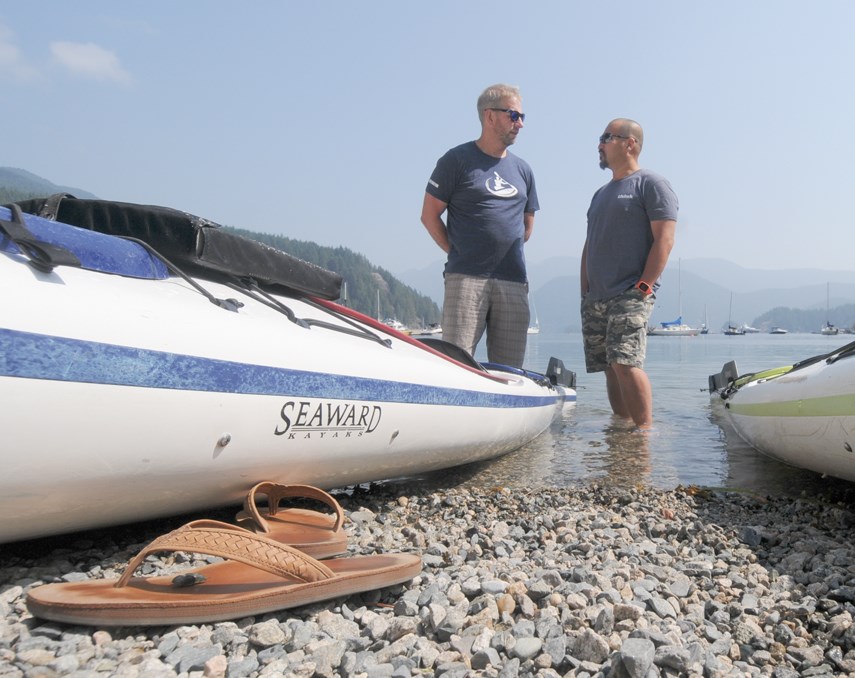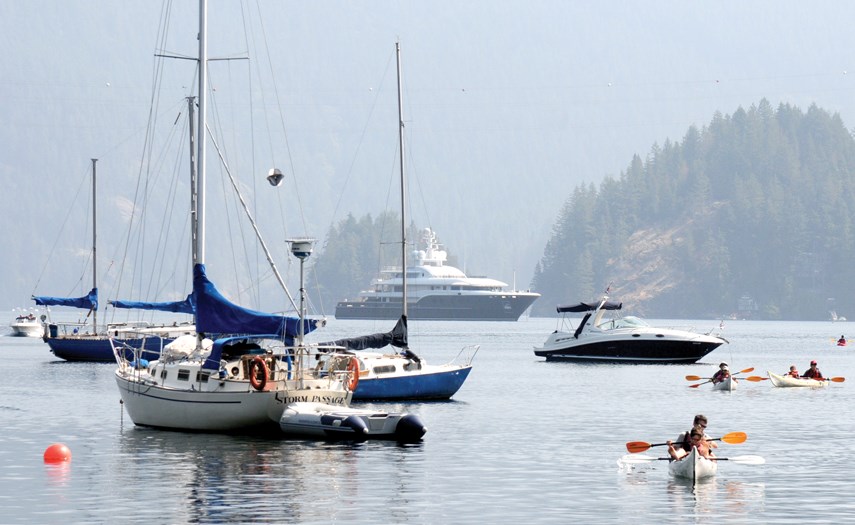Boaters overstaying their welcome is a perennial concern in Deep Cove but now some residents say they are fed up, citing reports of noisy generators running all night and encounters with human waste and feminine hygiene products on the water.
On a recent Sunday in August, avid paddle boarder Jay Inouye was out in the Cove with his 11-year-old daughter and steered through a sludge slick.
“And in the middle of it was a feminine hygiene product lapping against (the board),” described Inouye, who, on another occasion, paddled into some human excrement that smeared the side of his surfski.
Surveying the harbour around noon on Aug. 17, Deep Cove Kayak co-owner Bob Putnam watched a group of kids on kayaks trying to navigate the congested waters. Putnam pointed to two vessels anchored just off shore from his shop, recognizing them as not having moved for a long time and becoming part of the Cove landscape.
“Some of them are habituated,” said Putnam.
Live-aboards in the Cove are creating environmental and liability concerns, say some residents and business owners. Many of the boats aren’t outfitted with proper lighting for nighttime navigation, from what Putnam has observed.
“A lot of these guys don’t have holding tanks,” said Putnam, who has also found a used tampon floating in the water. “A lot of the time in the mornings you can see sludge slicks around here.”
Among the inventory of boats docked offshore in the Cove around mid-August was a superyacht, and a sailboat whose owner has been advertising on Airbnb, offering tours of the area aboard his “pirate ship.”
“Well if he does, where is he emptying his head?” questioned Inouye.

Under federal law, it is illegal to dump sewage from boats within three nautical miles of shore. The closest public pump-out station to Deep Cove is at a marina near Lions Gate Bridge.
Despite reports of sewage dumping, the water quality in Deep Cove has been excellent throughout the summer – and, in fact, for the past few years, according to North Shore medical health officer, Dr. Mark Lysyshyn.
However, E. coli counts are one thing, opines Inouye, but it’s still a concern if a boater empties their sewage tank in the water.
“Yeah, it’s going to dilute but it doesn’t mean I want to swim through it,” said Inouye.
Legally, boats are allowed to drop anchor in Deep Cove indeterminately.
Canadian maritime law states: “Vessels have the right to anchor for a reasonable period of time to rest, carry out re-provision or to complete repairs as long as it is not in an anchoring-restricted area as described under the Canada Shipping Act (2001) or another federal statute.”
The law does not quantify a reasonable length of time for anchorage, according to Transport Canada, which also oversees marine pollution enforcement.
Transport Canada spokeswoman Annie Joannette said they are aware of boats extending their stay in Deep Cove and are assessing the situation.
“The next step is to speak to the vessel owners,” stated Joannette in an email.
On the subject of sewage discharge complaints, Joannette said Transport Canada investigates on a case-by-case basis to verify the vessel in question has proper sewage management equipment. Disciplinary actions range from warning letters to withholding inspection certificates, monetary penalties and prosecution, with a maximum fine of $25,000.
“Although it could be difficult to locate the exact source of marine pollution after the fact,” added Joannette.
In an effort to gain control over anchoring time in the Cove, the District of North Vancouver is now looking at a recent court case from Victoria in which a B.C. Supreme Court judge ruled the city has the authority to regulate the Gorge waterway. Vessel and dock owners were given 60 days to remove their property from the waterway, according to a March 5 article in the Times Colonist newspaper.
On the heels of that decision, the district is considering following suit.
“We are exploring that with our lawyers right now,” said David Stuart, the district’s chief administrative officer. “If in fact we do have that authority as a result of this court case, then I’ll probably be recommending to council some kind of a (bylaw) which would limit the amount of time that you could actually moor in Deep Cove.”
Victoria’s bylaw limits boat owners to 48 consecutive hours of moorage in one spot, and a maximum of 72 hours in 30 days.
The district has received complaints recently about live-aboards in the Cove and it will investigate if there are issues that fall under their jurisdiction, said Stuart, citing a case of a boater running a generator at all hours of the day and night in contravention of noise bylaws. Stuart said he is also aware of another complaint, involving drugs on a boat, which the RCMP were sent to investigate.
Anticipating a proliferation of live-aboards not only in the Cove, but also around the region, Stuart said the district has been in regular talks with the Vancouver Fraser Port Authority about the issue.
While some residents raised concern in May about a few derelict boats in the Cove, the district said none of them were abandoned.
Putnam’s ultimate concern is environmental protection and for the water quality in the Cove. Inouye agrees, saying action on extended anchoring is long overdue.
“Every summer it’s bad, it’s just that no one really does much about it,” said Inouye.



